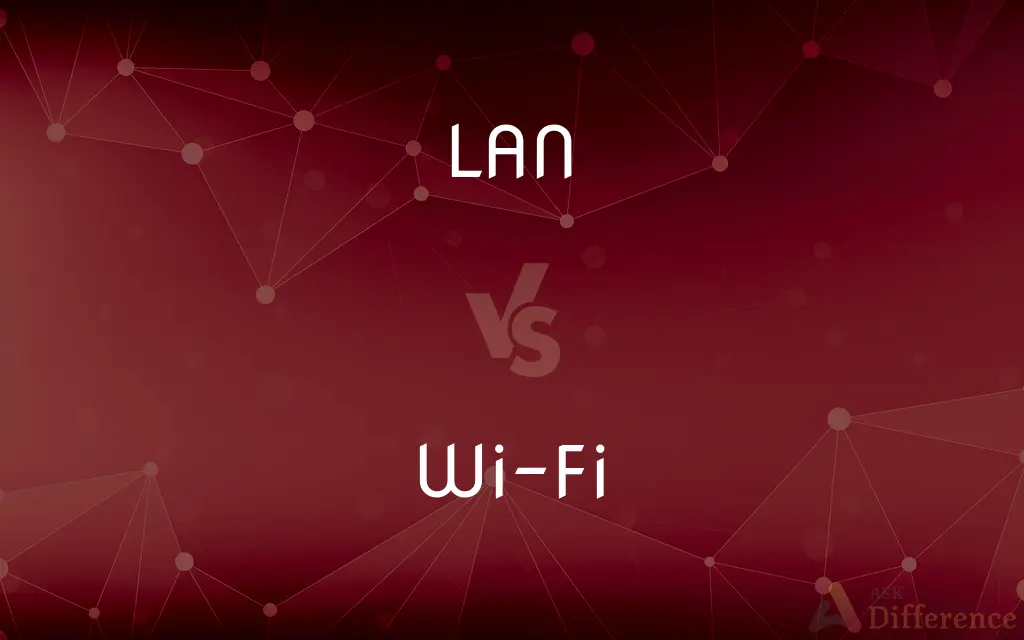LAN vs. Wi-Fi — What's the Difference?
By Tayyaba Rehman — Published on December 23, 2023
LAN (Local Area Network) is a network of devices within a limited area, while Wi-Fi is a wireless technology allowing devices to connect to LANs without physical cables.

Difference Between LAN and Wi-Fi
Table of Contents
ADVERTISEMENT
Key Differences
LAN, which stands for Local Area Network, refers to a network of interconnected devices within a specific geographic area. In contrast, Wi-Fi is a technology that facilitates wireless connectivity to such networks.
A significant distinction between LAN and Wi-Fi is the mode of connection. While LAN often implies devices connected through physical cables like Ethernet, Wi-Fi denotes wireless connections using radio waves.
LAN is more about the network's scope, encompassing both wired and wireless local connections. On the other hand, Wi-Fi strictly signifies wireless connections, usually facilitated by a router broadcasting a signal.
Establishing a LAN involves creating a network in a confined area like a building or campus. Wi-Fi, in essence, provides the wireless access points for devices to connect to that LAN without being tethered.
In conclusion, while LAN represents a localized network irrespective of connection type, Wi-Fi specifically alludes to the wireless medium through which devices access such networks.
ADVERTISEMENT
Comparison Chart
Definition
Local Area Network
Wireless Fidelity
Connection Type
Can be wired or wireless
Always wireless
Scope
Refers to the network's spatial domain
Refers to the technology enabling wireless connections
Typical Use
Interconnecting devices in a specific area
Providing wireless access to networks
Dependency
Can exist without Wi-Fi
Needs a LAN to provide internet connectivity
Compare with Definitions
LAN
Interconnects computers within boundaries.
For faster file sharing, the company decided to establish a LAN.
Wi-Fi
Uses radio waves for communication.
Wi-Fi signals can get weak if there's interference with the radio waves.
LAN
Limited to a specific geographic area.
The LAN only covers the university campus.
Wi-Fi
A technology enabling wireless connectivity.
She connected her phone to the Wi-Fi to save on data usage.
LAN
A network of devices in a specific location.
The office set up a LAN to connect all the computers.
Wi-Fi
Provides internet access without cables.
Thanks to Wi-Fi, laptops in the cafe had internet access.
LAN
Can be either wired or wireless.
The modern LAN in the building is wireless for user convenience.
Wi-Fi
Often requires a password for security.
Always set a strong password for your Wi-Fi to prevent unauthorized access.
LAN
Typically connected using Ethernet cables.
They ran Ethernet cables throughout the office to set up the LAN.
Wi-Fi
Routers broadcast the signal to devices.
The Wi-Fi router was placed centrally to ensure even distribution of the signal.
LAN
A system that links together electronic office equipment, such as computers and printers, and forms a network within an office, building, or group of buildings
Wi-Fi
Alternative spelling of Wi-Fi
LAN
A local area network; a network{3} connecting computers and word processors and other electronic office equipment within a small area, to create an inter-office system, typically within one building or one site of a corporation. Contrasted to WAN, a wide-area network.
LAN
A local computer network for communication between computers; especially a network connecting computers and word processors and other electronic office equipment to create a communication system between offices
Common Curiosities
Do I need a router for Wi-Fi?
Yes, a router is typically required to broadcast the Wi-Fi signal.
How is Wi-Fi different from LAN?
While LAN refers to a network within a limited area, Wi-Fi denotes the wireless technology allowing connectivity to LANs.
Is Wi-Fi as secure as a wired LAN?
While Wi-Fi can be secure with proper settings, wired LANs inherently have less vulnerability to certain attacks.
How far can Wi-Fi signals reach?
Typically, Wi-Fi signals reach up to 150 feet indoors and 300 feet outdoors, but range extenders can increase this.
What does LAN stand for?
LAN stands for Local Area Network.
Why might one prefer a wired LAN over Wi-Fi?
Wired LANs can offer faster speeds, more stability, and enhanced security over Wi-Fi.
Can a LAN be wireless?
Yes, a LAN can be wireless if devices connect via Wi-Fi or other wireless technologies.
Can Wi-Fi work without LAN?
Wi-Fi is a means to access a LAN wirelessly; thus, it requires a LAN for internet connectivity.
Are Ethernet connections part of LAN?
Yes, Ethernet connections are wired components of a LAN.
How can I improve my LAN's speed?
Using higher-quality cables, modern routers, and minimizing network congestion can improve LAN speeds.
Does every LAN have Wi-Fi?
No, not every LAN offers Wi-Fi. Some might be strictly wired.
Can multiple devices connect to a single Wi-Fi?
Yes, multiple devices can connect to one Wi-Fi network, limited by the router's capacity.
Is LAN typically faster than Wi-Fi?
Wired LANs usually offer faster and more consistent speeds than Wi-Fi because of no interference and signal degradation.
Can Wi-Fi signals pass through walls?
Yes, but walls can weaken the signal, especially if they're thick or contain metal.
Why might my Wi-Fi connection drop intermittently?
Common reasons include router issues, interference, overloaded networks, or physical obstructions.
Share Your Discovery

Previous Comparison
Unqualified Report vs. Qualified Report
Next Comparison
Beef Stock vs. Beef BrothAuthor Spotlight
Written by
Tayyaba RehmanTayyaba Rehman is a distinguished writer, currently serving as a primary contributor to askdifference.com. As a researcher in semantics and etymology, Tayyaba's passion for the complexity of languages and their distinctions has found a perfect home on the platform. Tayyaba delves into the intricacies of language, distinguishing between commonly confused words and phrases, thereby providing clarity for readers worldwide.












































